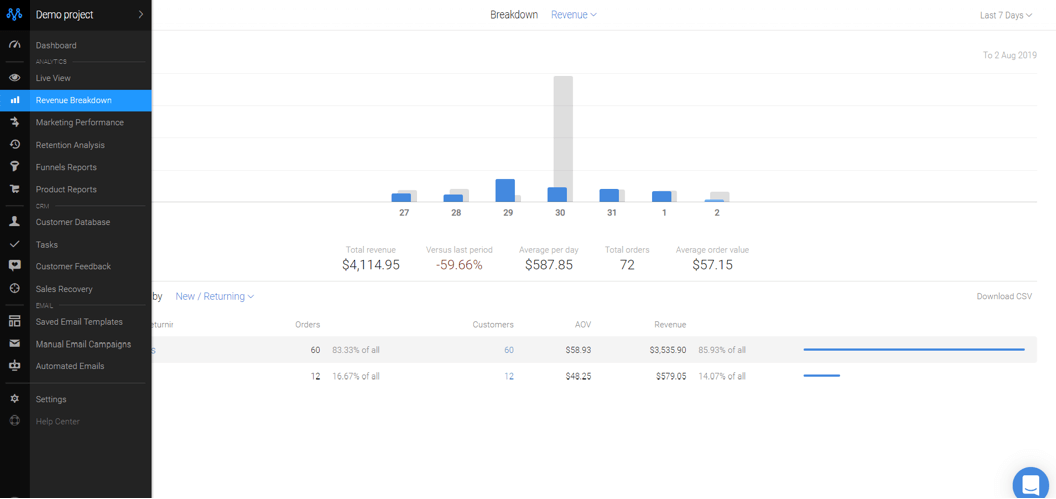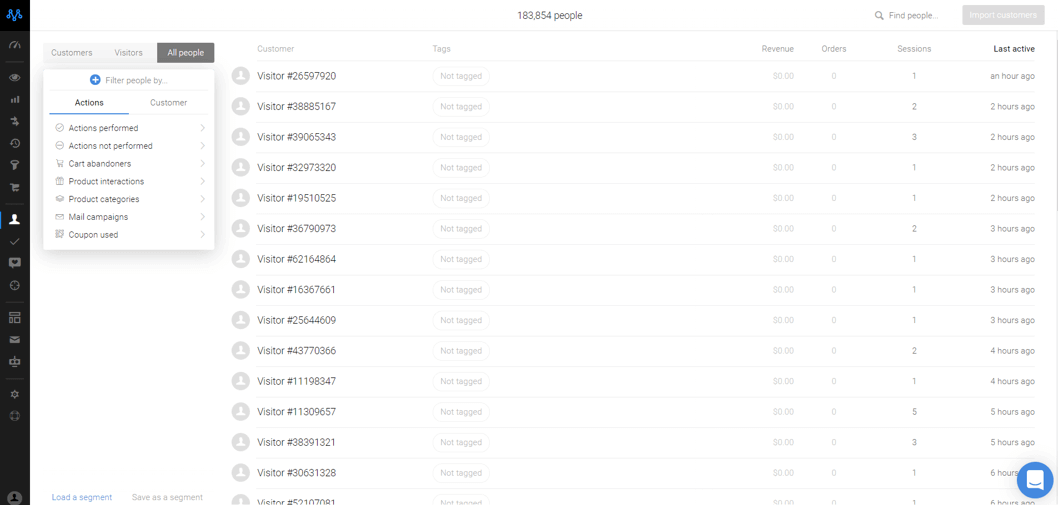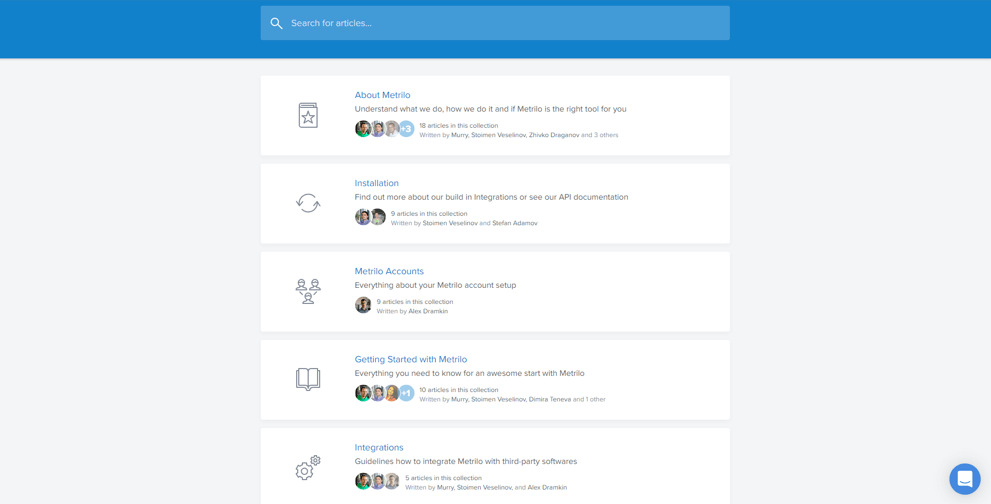We’re in an age of big data and deep analytics, where it’s well understood that businesses are only as good as the information they’re operating on.

The same is true of Ecommerce webstores, and to that end, a myriad of services have emerged over the years to inform and support Ecommerce efforts. Google Analytics is perhaps the most popular of these, but for many webstores, it isn’t necessarily the most effective. Moreover, in the cutthroat competitive world of online selling, using anything but the best tools can lead to costly handicaps.
That’s why it’s increasingly important for webstores to remain aware of the most impactful tools in their industry, like Metrilo.

This all-in-one Ecommerce analytics service launched in 2014, and since then, rapidly expanded its business and accumulated some high praise. It’s available in English only, with support in English, Spanish, and Russian, seeking to cater to a wide-range of international businesses. But is it the right analytics software to monitor, manage, and improve upon, your own Ecommerce webstore?
We had the chance to get our hands on a comprehensive demo of Metrilo; here’s how it worked for us.
April 2025 Offer – For a Limited Time Only:
Get WordPress Ecommerce Tracking for EDD Plugin for 20% off! Don’t miss out!
Our First Impressions of Metrilo’s Data Analytics and CRM
Accessing Metrilo is a cakewalk, with a fast and simple installation process to join its software with your webstore. It only takes about five minutes to complete, and is specially designed to connect smoothly with any Magento, WooCommerce, or Shopify store.
But that’s not to say that one of these three services are required. Even if using a different Ecommerce service, or a custom platform, integrating Metrilo remains a relatively effortless task.

After installation, you’ll be met with a comprehensive dashboard containing reports on all your webstore’s Ecommerce Key Performance Indicators (KPI).
They include everything you need to get a better grasp on the direction your webstore is heading. From store revenue-over-time and visitor conversion rates, to top performing products and most valuable customers, it’s all here and more.
The value of this information can’t be under-stressed either.
Being able to see the ins-and-outs of your revenue stream—what channels people are using to find your business and where your best sales are coming from—is critical to understanding and influencing the nature of your business’ future performance.

Some of the Biggest Benefits Metrilo Analytics Showed Off-the-Bat:
- The software’s web traffic reporting was a great way for us see our top performing channels, and discover where to focus our next marketing efforts.
- Historical data processing allowed us to easily import the store data we accumulate prior to using Metrilo to analyze the full scope of our operations.
- Retention analysis breakdowns let us track repeat orders to determine our retention rates by cohorts, and product sales, to make informed improvements across our campaigns.
- Conversion funnel analysis that let us see which of our efforts were bringing in hesitant shoppers, which were bringing in paying customers, and how we could bring in more of the latter.
- Product performance tracking that provided a fantastic window into understanding how to optimize our product presentations and marketing campaigns.
Gaining such deep insights into our store was encouraging, but this was still only half of what Metrilo promised. The platform also claims to offer store customer relationship management (CRM) features, and marketing email functionality, to help employ analytics empowered strategies.

The Most Notable of these CRM Features Ended Up Being:
- A “People Feature” customer database that displays individual customer behavior by automatically creating profiles surrounding their order history, product views, and website habits. From here we were able to easily examine customer order histories, add notes, and even message the accounts being reviewed.
- A convenient Customer Feedback area that compiled all our webstore’s user reviews in one place, with metrics for tracking user-satisfaction over time. There are also options to sort between positive, neutral, and negative reviews as well, so we could quickly see what about our webstore and products customers enjoyed, and where they would appreciate improvements most.
- A full Email Marketing system with built-in templates, newsletter management, customer segmentation, and automation for effective hands-off marketing initiatives. Most significantly, Metrilo makes it easy to send contextual emails at targeted types of users to stimulate higher conversion rates through personalized content. After all, people are much more likely to open emails that are tailored specifically to them and their interests.
Our Next Steps: Getting Acquainted and Applying Metrilo
Metrilo comes with comprehensive support documentation readily packed into the software’s help center, and naturally that’s where we went next.

We were more than happy to find how well organized, well written, and useful the guides here proved to be.
There’s guiding content on everything from “How To” pieces regarding certain service features, to general info articles that makes getting familiar with the platform a painless experience. Through these, we quickly learned how to navigate our analytics dashboard, import our previous store data, and manage email campaigns.
Then we got to work trying out the different aspects of the service.
Due to our limited time using the platform, we admittedly can’t demonstrate any tangible results between our previous initiatives, and what’s possible to accomplish with Metrilo over the long-term. But there’s a slew of businesses who have shared their customer stories, and left service reviews, all raving about how it helped them excel.
Not to mention, the company promises high results within the first 3 months using their service, quoting averages of:
•67% better Lifetime Customer Value
•39% better email conversions
•48% better retention rates
…and improved customer satisfaction across the board.
From our own Metrilo experience, these numbers don’t appear far-fetched in the slightest. It’s become more than apparent to us that this service does indeed provide webstores with massive potential for growth.
Testing How Metrilo Differs from Other Similar Services

As we’ve stated earlier, Metrilo is not to only service out there designed to provide the benefits we’re enjoying above. So, it’s only fair to look at how this software stacks up against its biggest competition.
Since Metrilo works on two ends, its analytics and its CRM features, that’s how what we’re breaking this comparison down. Additionally, we’re using Google Analytics and Mail Chimp as relevant reference points due to their widespread popularity, and respectively similar functions.
But between them all, Metrilo does bring a few new things to the table.
Metrilo’s Analytics versus Google Analytics

If you’ve used Google Analytics before, the first thing that will strike you is how much more user-friendly Metrilo is.
Compared to the required processes to sync a webstore with Google Analytics, Metrilo’s installation is streamlined and simple. Plus, its user-interface is specifically designed for webstore management alone, which makes navigating through reporting features a highly intuitive experience.
Unlike Google Analytics, Metrilo will automatically connect a webstore’s front-end and back-end for immediate and accurate revenue reporting, order statuses, and other live data changes. Its analytics are also primarily focused around customer behavior to best predict shopping habits and realize more effective design opportunities. Metrilo reports are all ready to go out-the-gate as well, requiring no prior setup like Google Analytics does.
It is worth noting: It doesn’t have to be one or the other.
Many Metrilo users still maintain their old Google Analytics software, using both services in tandem to manage their webstore’s analytics. However, there are plenty examples of users who have left Google Analytics entirely in favor of Metrilo’s convenient all-in-one platform.
Metrilo’s Email Capabilities versus MailChimp’s

Mailchimp allows users to send newsletters and manage mailing lists of new customers with ease. However, it doesn’t provide the customer personalization features that Metrilo excels with, which does limit the effectiveness of email campaigns.
Additionally, Metrilo lets you send unlimited emails to unlimited list sizes, whereas MailChimp limits monthly messages based on pricing plans.
When it comes to automation, Mailchimp does offer a range of features to members with the right account type. Pre-set communications sent when specific timelines or customer triggers are met, and fast template-based email building, are both here. But at the same time, Metrilo does all this and more, while piling on deeper customization options for perfecting campaigns.
Importing historical data is another big area where these services differ. Mailchimp doesn’t allow older data to be imported in from a store, with the exception of previously saved email lists. Metrilo, however, combines its analytics and CRM features to automatically create customer profiles based off of every single past purchase. Additionally, with over 30 filters ranging from user interests, to general activity levels, Metrilo provides more accurate customer segmentation too.
Note: While we do like Mailchimp, and it’s a fine service for webstores just starting out, there’s no reason for both. Metrilo essentially does everything Mailchimp can, and more.
How Much this all Costs: Metrilo Pricing Plans

Though they readily offer free trials, Metrilo does not have a free version available. You can see the service’s pricing page here.
Rather, users choose between three plans with monthly payments that range between $119, $199, and $299–with each plan building upon the one before it. Yearly payments receive a discount and cost $1.190, $1.990 and $2.290, in that order (saving two months worth of billing each).
For instance, the lowest cost “Essentials” plan comes with analytics only, the second “Pro” plan includes everything the first does along with Customer Database and Retention analysis features, and so on. Live ask-us-anything chat support also comes with all Metrilo packages, but a personally assigned growth consultant only comes with the most premium plan.
Payment plans are also freely modifiable, meaning users may upgrade or downgrade their service at anytime without fear of consequence. Moreover, Metrilo offers complete refunds for any dissatisfied customers who request one within 30 days of starting their subscription.
So, while the service certainly isn’t cheap, it does allow users to pay as they please, and do so worry free.
The Final Verdict: Is Metrilo Right for You?

We were certainly more than impressed with Metrilo, and wouldn’t hesitate to suggest it to established webstores that are looking to gain Ecommerce analytics into their operations.
It combines the key features of other major Ecommerce services, and makes daily management much more effective and streamlined overall. The user-interface is friendly and enjoyable, and the company provides a strong support network to call upon if necessary.
Because of the service’s notable monthly price-tag, however, it probably won’t be the best out-the-gate Ecommerce analytics for budding webstores. Smaller operations that are still just getting started, with relatively little historical webstore data and shorter lists of customer contacts to work with, will probably want to keep Metrilo on the back-burner until they’ve hit their stride and can make full use of its services. Until then, there are enough lower cost and free software, like Mailchimp, that webstores can use to build themselves up.
But at the end of the day, there isn’t any reason to take our word for all of this alone. The platform offers a free 14-day trial, and the same comprehensive demo we accessed for those who request it here.
Meaning, there’s no harm in checking it out, and you’ll likely be pleasantly surprised.


